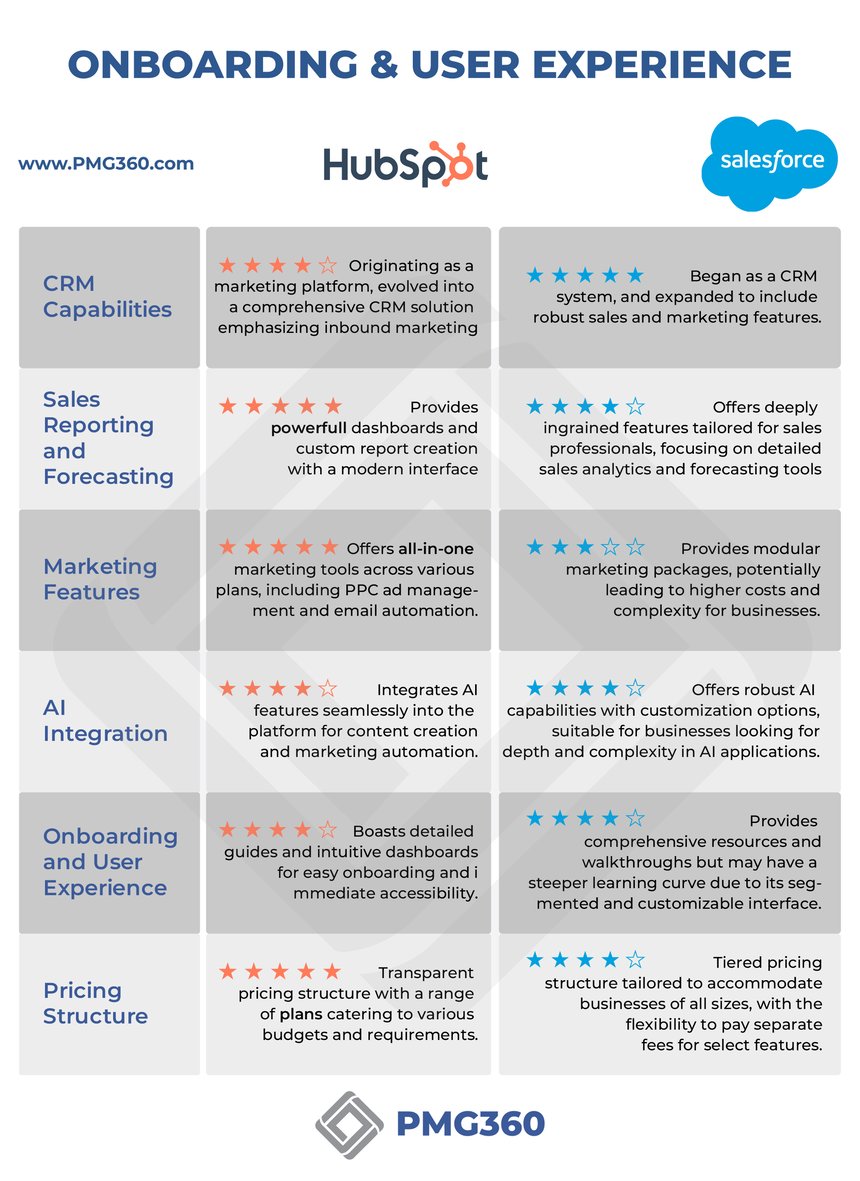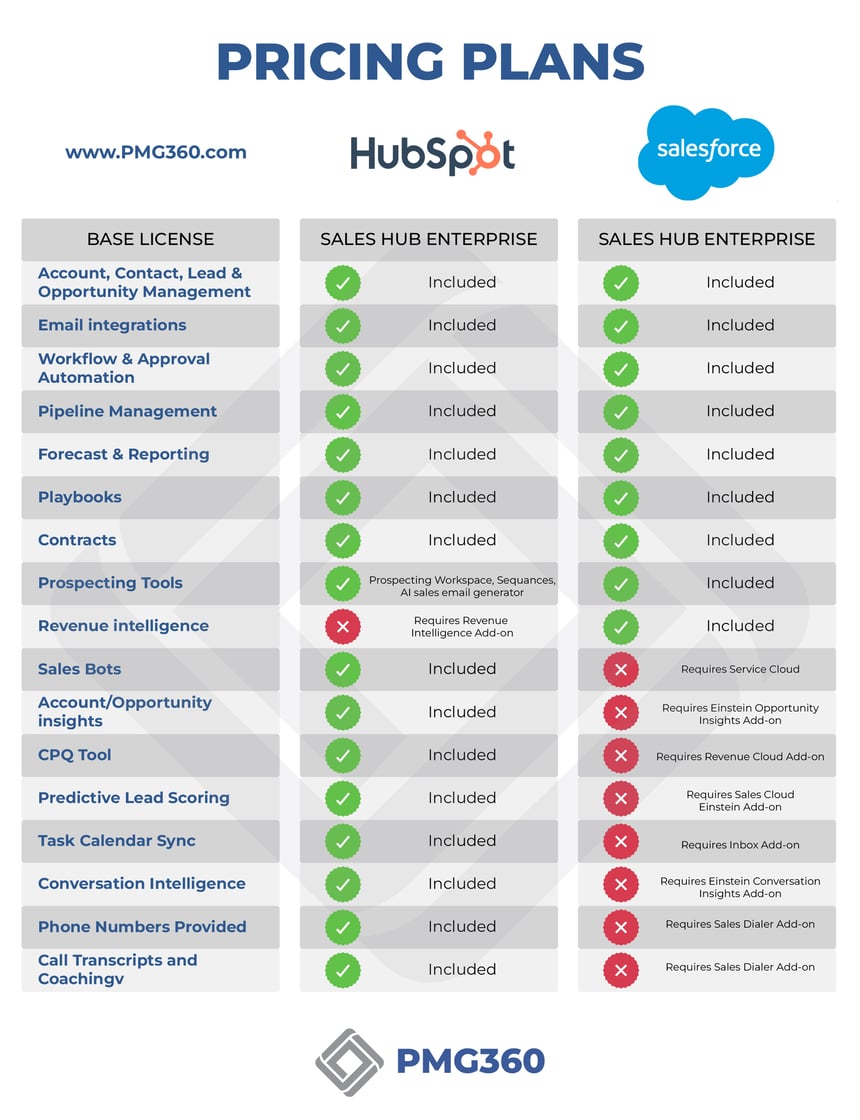Both HubSpot and Salesforce have solidified their positions as leading platforms in the world of CRM, sales, and marketing automation.
But when it comes down to choosing the best tool for your business, the devil is in the details.
Here's a breakdown to guide you through their key features and differences.
CRM Capabilities
HubSpot began its journey as a marketing platform, evolving into a comprehensive CRM solution designed to attract, engage, and delight customers. Its roots in inbound marketing give it a unique edge in nurturing leads and managing customer interactions with a marketer-friendly approach.
Salesforce, on the other hand, originated as a CRM system focused on sales automation. Over the years, it has expanded its offerings to include robust sales and marketing features, making it a powerhouse for sales teams looking for advanced functionalities.
While both platforms offer an array of CRM tools, including sales forecasting, analytics, and customer service features, their origins reflect in their strengths. HubSpot shines in its user-friendly design and integrated marketing capabilities, making it ideal for businesses looking for an all-in-one solution to manage customer relations and marketing efforts seamlessly.
Sales Reporting and Forecasting
When it comes to sales reporting and forecasting, Salesforce takes the lead with its deeply ingrained features tailored for sales professionals. Its focus on detailed sales analytics and forecasting tools makes it a go-to option for businesses that prioritize sales data analysis.
HubSpot, while not falling far behind, offers powerful dashboards and custom report creation that are both useful and intuitive. The platform's modern interface and ease of use make it a strong contender for businesses that value straightforward reporting alongside marketing tools.
Marketing Features
HubSpot stands out with its comprehensive marketing features available across various plans. Its all-in-one package approach, including PPC ad management, email templates, and marketing automation, offers businesses a cohesive toolset for executing wide-ranging marketing strategies within a single platform.
Salesforce, with its modular approach, allows for a more customized setup, adding marketing packages as needed. However, this can lead to higher costs and complexity, potentially making HubSpot a more accessible choice for businesses looking to streamline their marketing efforts without the hassle of integrating multiple packages.
[CASE STUDY] CRM SELECTION AND SETUP FOR A LEADING TECHNOLOGY FIRM
AI Integration
In the realm of artificial intelligence, both platforms offer cutting-edge AI tools designed to enhance productivity and decision-making. Salesforce's Einstein AI provides a robust suite of AI features, including predictive analytics and automated workflows, catering to businesses looking for depth and customization in their AI applications.
HubSpot, with its integrated AI features, offers a more user-friendly approach, making it easy for businesses to leverage AI for content creation, data insights, and marketing automation without the need for complex setups.
Onboarding and User Experience
HubSpot excels in user onboarding, offering detailed guides and intuitive dashboards that simplify the learning curve for new users. Its focus on ease of use and immediate accessibility makes it an attractive option for businesses looking for a CRM and marketing platform they can quickly integrate into their operations.
Salesforce, while offering comprehensive resources and walkthroughs, presents a steeper learning curve due to its more segmented and customizable interface. Businesses willing to invest the time in mastering Salesforce's capabilities will find it a powerful tool, but those looking for simplicity may lean towards HubSpot. 
Pricing Plans
When comparing Salesforce and HubSpot, it's essential to compare their pricing plans to understand the value they offer and the investment you will make.
Let's take a closer look at the pricing structures of both platforms and how they align with various features:

As we can see, both HubSpot and Salesforce offer a variety of features within their base licenses.
However, Salesforce may require additional add-ons for certain functionalities, while HubSpot includes them as part of its enterprise package.
The cost-effectiveness of each platform depends on your business's specific needs and priorities.
Ready To Grow Your Pipeline?
Our team of professionals is ready to discuss your project and offer a cost effective way to promote your business to generate quality leads for your sales efforts
PMG360: Your CRM Solutions Partner
At PMG360, we specialize in providing comprehensive CRM services tailored to meet the unique needs of your business. Whether you're exploring CRM options for the first time or considering a switch from your current platform, we're here to guide you every step of the way.
Our team of experts is dedicated to helping you find the CRM solution that best aligns with your business goals and objectives. Through a free consultation call, we'll analyse your requirements and recommend the most suitable CRM platform, whether it's HubSpot, Salesforce, or another option.
Once we've identified the ideal CRM for your business, we'll assist you in setting it up to ensure a seamless integration into your operations. Our goal is to streamline your processes, enhance efficiency, and ultimately, cut operational costs.
If you already have a CRM in place but are considering a switch, we can help with that too. Our experienced team will facilitate a smooth transition to your new CRM, minimizing downtime and maximizing productivity.
Schedule your free consultation today and take the first step towards optimizing your CRM strategy with PMG360.
frequently asked questions
keep updated on our latest blogs
Subscribe to our Newsletter and never miss an update!


%20(1).png?width=383&height=246&name=Sales%20Optimization%20in%20CRM%20(1)%20(1).png)